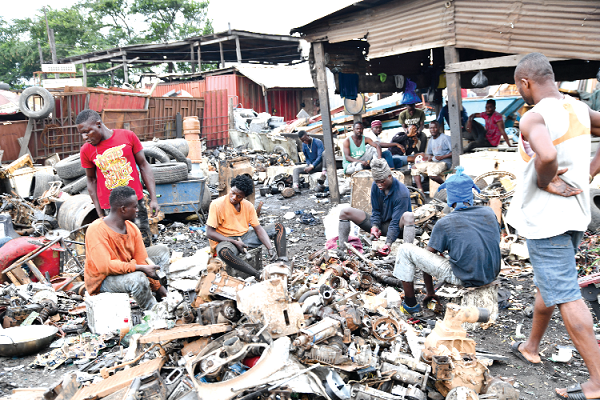
E-waste; forgotten menace
The Sustainable Development Goals (SDGs) hinge on a digitally connected world. As the world transitions into a global village, the knowledge economy has also emerged with more dependence on electrical and electronic equipment or e-products.
Demand for some e-products has risen greatly, particularly with the COVID-19 pandemic.
The lifespan of most of these e-products is currently shorter; thus, they are discarded as soon as acquired.
Failure
Developing countries depend on e-products from developed countries; however, the failure to manage obsolete and unrepairable e-products has resulted in e-waste, to the detriment of environmental and human health.
Agbogbloshie or Old Fadama in Accra, which is synonymous with the dumping of e-waste, is still the place where most e-waste is dumped. Other unregulated scrap yards within the Tema and Ashaiman metropolises have all contributed to this menace.
A common trend is how individuals in the communities have resorted to the ‘midnight’ burning of household waste, further compounding the problem.
The burning of such e-waste in the open, with the fumes being released into the atmosphere and with some of the waste sinking into the soil, has severe human and environmental health consequences.
Communities near unregulated e-waste recycling sites are prone to risk from the inhalation of toxic chemicals and exposure to radiation.
One of the significant challenges to e-waste management in Ghana is the laxity in the enforcement of the law.
The Hazardous and Electronic Waste Control and Management Act, 2016 (Act 917) is a well-crafted act which when enforced can result in efficient e-waste management.
Way forward
Local representatives of international corporate organisations dealing in e-business (including Hisense, LG, Samsung, Sony, Tecno, etc.) must all be involved in solving this problem.
In jurisdictions such as Switzerland and Sweden, citizens are encouraged to return overused e-products for cash, which helps reduce e-waste in the system.
Also, manufacturers of e-products are not let off the hook; when they flout e-waste management laws, they are punished.
We can learn from the experiences of developed countries by adopting processes that provide ‘informal’ take-back systems or ‘exchange-old-for-new’.
Pragmatic policies must be directed at the informal recycling sector to harness the skills of the young men in this sector.
These young men can still go from household to household and collect e-waste, but instead of recycling themselves, they can send it to formal or recognised recycling centres for a fee. That is one of the ways to reduce improper handling and divert more e-waste flows into the formal recycling sector.
The Environmental Protection Agency (EPA) must take up the task of compiling data of all e-products importing and assembling companies.
The availability of accurate information is needed to help policy makers understand the roles of the various players within the e-waste management structure and the material flows between and among them.
Such information may also help policy makers develop collection channels, recycling facilities and all other aspects of e-waste management.
I was pleased when the issue of e-waste management was highlighted at the vetting of the minister-designate for Environment, Science, Technology and Innovation.
The minister should take the threat of e-waste seriously and back it up with policies for effective management.
So far as we continue to purchase e-products, we must also ensure that we have an efficient system of disposing them off when their lifespan is over.
The key is to stop the importation of end-of-use e-products (second hand e-products). Ghana must not be a dumping site for e-waste.
The writer is a media monitor with research interests in presidential rhetoric, development communication and new media technology.
E-mail:
